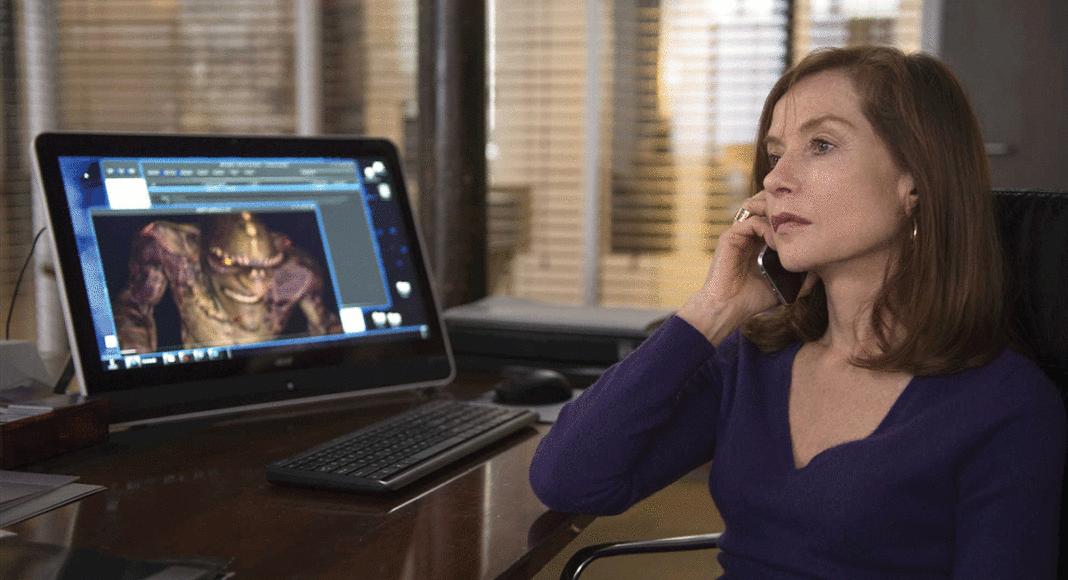Paul Verhoeven knows a thing or two about sex and violence. The Dutch-born filmmaker, perpetrator of Basic Instinct and the notorious Showgirls, has made a career out of exploring our darker impulses—where they come from, where they lead, how they spill over into our everyday lives, and how they might filter down through the generations. All of these themes converge in Elle, Verhoeven’s intense drama of violation and vindication, featuring a typically poised-yet-fearless performance from Isabelle Huppert.
The film is scripted by David Birke, from the novel, Oh …, a contemporary French thriller by author Philippe Djian. After decades in Hollywood, Verhoeven returned to his Dutch roots a few years ago for the brilliant and intricate World War II thriller Black Book. In Elle, he is working for the first time in France, and in the French language. But nothing is lost in translation in this perverse morality play about perpetrators and targets, and the shifting lines between them.
Michele LeBlanc (Huppert) is the boss at a Paris company that produces popular, excessively violent fantasy video games. One night, she herself is violently raped by a masked intruder who breaks into her home. Reacting with what we think of as ridiculously French aplomb, she cleans up, takes a bath, orders take-out, and talks with her visiting grown son, Vincent (Jonas Bloquet). The next day, she has all the locks changed and the doors repaired, but she never goes to the police, or tells anyone—until she mentions it casually at dinner a few nights later, to the horror of her ex-husband, Richard (Charles Berling), her best friend and business partner, Anne (Anne Consigny), and Anne’s husband, Robert (Christian Berkel).
At work, we glimpse her dynamic with her young, mostly male employees, including one surly game designer who’s always clashing with her, and the nerdy one with a crush on her. Her daily routine also brings her into contact with the young stud hired for sex by her aging mother (Judith Magre), and the friendly young couple next door (Laurent Lafitte and Virginie Efira). As Michele stocks up on pepper spray and weaponry, it’s clear that she (and Verhoeven) are lining up potential suspects.
But Elle is far from the typical revenge melodrama. There are complications, beginning with the horrifically violent games on which Michele’s empire depends. (We see one early in the movie, in which a giant, many-tentacled monster brutalizes a human female.) Michele, herself, has a matter-of-fact approach to consensual sex. And a dark incident from Michele’s childhood gradually comes into play, involving her long-estranged father, for which she might be seeking absolution.
None of these factors (or all of them) may have anything to do with the crime done to Michele, but it sets up the context in which the psychological game of cat-and-mice plays out. Although not quite as innovative as the original Girl With the Dragon Tattoo films, Elle echoes a similar view of damaged men acting out. As different as their personalities are, Richard and Robert are interchangeably ineffectual. Hapless Vincent is henpecked by his domineering girlfriend. Threatening texts and obscene digital images ramp up the stakes.
But there’s also a lot of wry, unexpected humor, with witty dialogue and droll observations. When Richard, who writes middling literary fiction, tries to pitch a scenario for Michele’s game company, she explains that her customers are the wrong demographic. “The demographic oblivious to quality,” he mutters.
Huppert has gotten a lot of buzz for her performance (and has already won a Golden Globe). One thing is the sheer stamina required: she’s onscreen in practically every frame, in a part far more rich and complex than most actresses ever get, especially over age 50. But Huppert never chews the scenery. In a part that’s decidedly not warm and cuddly, in an often disturbing film, it’s her subtlety, craft, presence, and her ability to surprise us—along with her almost supernatural cool—that keeps the viewer riveted.
ELLE
(***)
With Isabelle Huppert. Written by David Birke. Directed by Paul Verhoeven. A Sony Classics release. Rated R. 130 minutes. In French with English subtitles.














